- Home
- Alexandre Dumas
The Thousand and One Ghosts Page 3
The Thousand and One Ghosts Read online
Page 3
When he reached the gate we have just described, Jacquemin stopped.
The gendarmes tried to force him in.
“Monsieur Ledru,” he said turning round, “Monsieur Ledru, you promised you wouldn’t leave me.”
“Well, here I am,” replied the mayor.
“Your arm! Your arm!”
And he staggered as if he were about to fall over.
Monsieur Ledru went over to him, motioned the gendarmes to let the prisoner go and offered him his arm.
“I will answer for him,” he said.
It was clear that, at this moment, Monsieur Ledru was no longer the local mayor intent on punishing a crime, but a philosopher exploring the domain of the unknown.
And his guide in this strange exploration was none other than – a murderer.
The doctor and the police superintendent were the first to go in, then Monsieur Ledru and Jacquemin; then the two gendarmes, then a privileged few, among whom I found myself, thanks to the contact I had had with the gendarmes, for whom I was already no longer a stranger, having had the honour to meet them in the plain and to show them my shooting permit.
The gate was closed on the rest of the population, who stayed grumbling outside.
We made our way to the door of the little house.
Nothing inside gave any indication of the terrible event that had occurred here: everything was in its place; the bed of green serge in its recess and, at the head of the bed, the black wooden crucifix topped by a branch of boxwood that had been hanging there, increasingly withered, since the previous Easter. On the mantelpiece was a wax image of the Christ Child, lying in a bed of flowers, between two Louis XVI candlesticks that had once been silver-plated; on the wall, four coloured engravings framed in black wood and representing the four parts of the world.
On a table a place was set, in the hearth a pot-au-feu was bubbling, and, near a cuckoo clock striking the half-hour, a bread bin lay open.
“Well,” said the doctor in his jovial tone, “I can’t see anything unusual yet.”
“Go through the door on the right,” murmured Jacquemin hoarsely. We followed the prisoner’s indications, and found ourselves in a kind of pantry in the corner of which there was an open trapdoor: on it there flickered a light from below.
“There, there,” murmured Jacquemin, clinging to Monsieur Ledru’s arm with one hand and pointing to the trapdoor with the other.
“Aha!” said the doctor in low tones to the police superintendent, with the terrible smile you see on people who are frightened of nothing because they believe in nothing. “It seems that Madame Jacquemin has followed the precept of Master Adam,” and he hummed:
“If I die, let me be buried
Down in the cellar with my—”*
“Quiet!” interrupted Jacquemin, his face livid, his hair on end, sweat breaking out on his brow. “Don’t sing here!”
Struck by his tone of voice, the doctor fell silent.
But almost immediately, as he walked down the first steps to the cellar, he asked, “What’s this?”
And, bending down, he picked up a sword with a broad blade.
It was the two-handed sword which Jacquemin had, as he’d said, taken on 29th July 1830* from the Artillery Museum; the blade was covered in blood.
“Do you recognize this sword?” he said to the prisoner.
The police superintendent took it from the doctor’s hands.
“Yes,” replied Jacquemin. “Go on! Go on! Let’s be done with it.”
This was the first piece of evidence of the murder.
We went down into the cellar, in the formation I have already mentioned.
The doctor and the police superintendent first, then Monsieur Ledru and Jacquemin, then the two people who had been in the mayor’s house, then the gendarmes, then the privileged few, among whom I found myself.
Having gone down to the seventh step, my eyes darted round the cellar and took in the terrible scene I will try to depict.
The first object on which my gaze fell was a headless corpse lying near a barrel whose spigot, half opened, let out a thin trickle of wine which, as it flowed, formed a rivulet that disappeared under the barrel stand. The corpse was half twisted, as if the torso, writhing on its back, had started to turn in its agony but its legs had not been able to follow it. On one side, the dress was hoisted up to the garter.
It was evident that the victim had been struck at the moment when, on her knees in front of the barrel, she had been starting to fill a bottle that had fallen from her hands and was now lying at her side.
The entire upper part of the body was drenched in a pool of blood. Standing on a sack of plaster leaning against the wall, like a bust on a column, we saw or rather guessed at a head, half concealed by its cascade of hair. A streak of blood ran halfway down the sack.
The doctor and the police superintendent had already walked round the corpse and were now standing opposite the stairs.
Towards the middle of the cellar were the two friends of Monsieur Ledru and a few curious onlookers who had jostled to reach this far.
At the foot of the stairs was Jacquemin, who had completely refused to budge any further than the last step. Behind Jacquemin, the two gendarmes.
Behind the two gendarmes, five or six people, including myself, all clustered together on the stairs.
This entire lugubrious interior was lit by the tremulous flicker of a candle placed on the very same barrel from which the wine was flowing, and opposite which lay the corpse of Jacquemin’s wife.
“A table and a chair,” said the police superintendent, “and let’s get it all down in writing.”
3
The Deposition
The furniture requested was passed over to the police superintendent. He made sure his table was steady, sat down behind it, asked for the candle, which the doctor passed to him, stepping over the corpse as he did so, drew from his pocket a pot of ink, pens and paper and started to draw up the statement.
As he was writing the preamble, the doctor, filled with curiosity, took a step towards the head placed on the sack of plaster, but the superintendent stopped him.
“Don’t touch a thing,” he said. “We must observe the regulations.”
“You are quite right,” said the doctor.
And he went back to his place.
There were a few minutes of silence during which the only sound was the police superintendent’s pen scratching on the rough government paper: we could see the lines following on from one another with the rapidity of a writer’s tried and trusted turns of phrase.
After a few lines, he looked up and gazed around.
“Who will act as witness?” the police superintendent asked the mayor.
“Well,” said Monsieur Ledru, indicating his two friends standing in a group with the seated police superintendent, “these two gentlemen, to begin with.”
“Very well.”
He turned to me.
“And then Monsieur here, if it does not put him out to see his name featuring in an official statement.”
“Not at all, Monsieur,” I replied.
“In that case, let Monsieur come down,” said the police superintendent.
I felt rather reluctant to get close to a corpse. From where I was, certain details, without being altogether invisible, appeared less hideous to me, concealed as they were in a half-gloom which shed over their horror the veil of poetry.
“Is it really necessary?” I asked.
“What?”
“For me to come down.”
“No. Stay there, if you’re more comfortable there.”
I gave a nod which meant “I prefer to stay where I am”.
The police superintendent turned towards the one of Monsieur Ledru’s two friends who was nearest him.
“Your surname, first names, age, description, profession and address?” he asked, with the volubility of a man used to asking these sorts of questions.
“Jean-Louis Alliette,”* replied the man he was addressing, “also known as Etteilla – an anagram; I’m a man of letters and I live at 20 Rue de l’Ancienne-Comédie.”
“You forgot to tell me your age,” said the police superintendent.
“Should I tell you my real age, or the age people think I am?”
“Tell me your real age, damn it! People have only one age.”
“Well, Monsieur, with all respect, there are certain people, Cagliostro, the Count of Saint-Germain, the Wandering Jew, for instance…”*
“Are you trying to tell me you’re Cagliostro, the Count of Saint-Germain or the Wandering Jew?” said the Superintendent, knitting his brow at the idea someone was making fun of him.
“No, but—”
“Seventy-five years old,” said Monsieur Ledru. “Put ‘seventy-five years’, Monsieur Cousin.”
“Very well,” said the police superintendent.
“And what about you, Monsieur?” he continued, turning to Monsieur Ledru’s second friend.
And he repeated exactly the same questions that he had put to the first.
“Pierre-Joseph Moulle, age sixty-one, ecclesiastic attached to Saint-Sulpice, address 11 Rue Servandoni,” came the reply, uttered in a mild tone of voice.
“And you, Monsieur?” he asked, addressing me.
“Alexandre Dumas, playwright, age twenty-seven. I live in Paris, at 21 Rue de l’Université,” I replied.
Monsieur Ledru turned round to look at me, and bowed graciously; I responded in a similar fashion, as best I could.
“Very well!” said the
police superintendent. “Listen and tell me if this is all right, gentlemen, and whether you have any observations to make.” And, in that nasal, monotonous tone of voice you only find in public officials, he read:
“On this day, 1st September 1831, at two o’clock in the afternoon, having been alerted by public rumour that a crime of murder had been committed in the village of Fontenay-aux-Roses upon the person of Marie-Jeanne Ducoudray, by one Pierre Jacquemin, her husband, and that the murderer had betaken himself to the house of Monsieur Jean-Pierre Ledru, mayor of the aforesaid village of Fontenay-aux-Roses, to declare, of his own volition, that he was the perpetrator of this crime, we took haste to make our way also to the house of the aforesaid Jean-Pierre Ledru, 2 Rue de Diane; at which house we arrived in the company of Monsieur Sébastien Robert, doctor of medicine, living in the aforesaid village of Fontenay-aux-Roses, and there we found, already in the hands of the gendarmerie, the aforesaid Pierre Jacquemin, who repeated in front of us that he was the perpetrator of the murder of his wife; whereupon we requested him to follow us to the house where the murder had been committed. This request he at first refused, but he soon yielded, at the urging of the mayor, whereupon we made our way to the Impasse des Sergents, where the house in which Monsieur Pierre Jacquemin lives is situated. On arrival at this house, the gate having been closed behind us to prevent the populace from invading it, we entered a first room where nothing indicated that a crime had been committed; then, at the invitation of the aforesaid Jacquemin himself, from the first room we passed into a second, in the corner of which a trapdoor giving access to a stairway was open. This stairway having been indicated to us as leading to a cellar where we were to discover the victim’s body, we started to go down the aforesaid stairway, on the first steps of which the doctor found a sword with a cross-shaped hilt, with a broad and sharp blade, which the aforesaid Jacquemin admitted that he had taken for himself, at the time of the July Revolution, from the Artillery Museum, and used to perpetrate the crime. And on the floor of the cellar we found the body of the wife of Jacquemin, lying on her back and swimming in a pool of blood, having her head separated from her trunk, which head had been placed upright on a sack of plaster leaning against the wall, and the aforesaid Jacquemin having acknowledged that this corpse and this head were indeed those of his wife, in the presence of Monsieur Jean-Pierre Ledru, mayor of the village of Fontenay-aux-Roses; of Monsieur Sébastien Robert, doctor of medicine and living in the same Fontenay- aux-Roses; of Monsieur Jean-Louis Alliette, also known as Etteilla, man of letters, aged seventy-five and living in Paris, 20 Rue de l’Ancienne-Comédie; of Monsieur Pierre-Joseph Moulle, aged sixty-one, ecclesiastic, attached to Saint-Sulpice, and living in Paris, 11 Rue Servandoni; of Monsieur Alexandre Dumas, playwright, aged twenty-seven, and living in Paris, 21 Rue de l’Université, we proceeded to question the accused as follows.”
“Is that all right, gentlemen?” asked the police superintendent, turning towards us with an air of evident satisfaction.
“Perfectly, Monsieur!” we all replied with one voice.
“Very well, let us question the accused!”
Then, turning to the prisoner, who, throughout this reading, had been breathing heavily, like a man oppressed, he said:
“Prisoner, you surname, first names, age, address and profession?”
“Is this going to take a long time?” asked the prisoner, like a man at the end of his tether.
“Answer: your name and surname?”
“Pierre Jacquemin.”
“Your age?”
“Forty-one.”
“Your address?”
“You know perfectly well, since you’re in it.”
“No matter, the law requires you to answer this question.”
“Impasse des Sergents.”
“Your profession?”
“Quarryman.”
“Do you admit to being the perpetrator of the crime?”
“Yes.”
“Tell us what led you to commit it, and the circumstances in which it was committed.”
“What led me to commit it… there’s no point in asking that,” said Jacquemin. “That will always remain a secret between me and the woman you see there.”
“But there is no effect without a cause.”
“The cause… well, I tell you, you’ll never know. As for the circumstances, as you call them, do you want to know them?”
“Yes.”
“Well, I’ll tell you. When you work underground the way we do, in the darkness, and you think you have some reason to get upset, you eat your heart out, you see, and then you start getting nasty ideas.”
“Oh! Oh!” interrupted the police superintendent. “So you admit to premeditation?”
“What? Since I’ve told you I’m confessing to everything, isn’t that enough for you?”
“Yes indeed. Speak on.”
“Well, that nasty idea that came to me was to kill Jeanne. It went round and round in my head for more than a month, my heart restrained my head, till finally something a mate of mine said decided me.”
“What did he say?”
“Oh, that’s one of the things that are none of your business. This morning, I says to Jeanne, ‘I’m not going to work today; I want to relax as if it was a holiday; I’m going to play boules with some mates. Make sure dinner’s ready at one o’clock.’”
“‘But—’ she began.
“‘That’s enough, no buts. Dinner ready at one, d’you hear me?’
“‘All right,’ said Jeanne. And she went out to fetch the pot-au-feu.
“Meanwhile, instead of going to play boules, I took the sword you can see there. I’d sharpened it myself on a whetting stone. I went down into the cellar and hid behind the barrels, saying to myself, ‘She’s bound to come down into the cellar to draw some wine; then we’ll see.’ The time I spent squatting there, behind the cask that’s standing upright… well, I don’t know – I was feverish, my heart was beating and in the darkness I saw red. And then, there was this voice inside me and around me that kept repeating what my mate said to me yesterday.”
“But really, what did he say?” persisted the superintendent.
“No point asking. I’ve already told you that you’ll never know. Finally, I heard the swoosh of a dress and footsteps approaching. I saw a flickering light, the lower half of her body coming down, then the upper half, and then her head… It was perfectly visible, her head… She was holding her candle.
“‘Ah,’ I said to myself, ‘perfect!’ And I repeated under my breath what my mate had told me. Meanwhile, she was approaching. I swear you’d have thought she had an idea it was going to turn out badly for her. She was afraid; she kept looking round on all sides; but I was well hidden; I didn’t move. Then she knelt down in front of the barrel, brought the bottle up and turned on the spigot. I stood up. She was on her knees, see. The noise of the wine dropping into the bottle meant she couldn’t hear me. And, in any case, I didn’t make any noise. She was on her knees like a guilty woman, like someone condemned. I lifted the sword and… swish!… I don’t even know if she cried out; her head rolled away. At that moment, I didn’t want to die; I wanted to get away. I’d intended to dig a hole in the cellar and bury her. I ran over to the head – it was rolling around, while the body fell the other way. I had a sack of plaster ready to hide the blood. So I leant down and got the head – or rather, the head got me. Look.”
And he showed his right hand, where a big bite had mutilated his thumb.
“What? The head got you?” said the doctor. “What the devil do you mean?”
“I mean she gave me a big deep bite, as you can see. I mean she wouldn’t let go. I put her on the sack of plaster, I leant it against the wall with my left hand and I tried to wrest my right hand away from her; but after a few moments her teeth let go of their own accord. I pulled my hand out; then, you see, it was perhaps madness, but it seemed to me that this head was alive; its eyes were wide open. I could see them clearly, since the candle was on the barrel, and then her lips… her lips started moving, and as they moved, her lips said, ‘You wretch, I was innocent!’”
I don’t know what effect this statement had on the others; but for my part, I know that sweat was pouring down my brow.

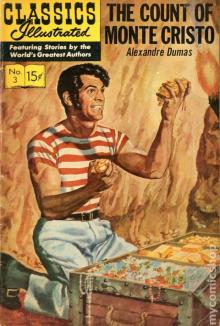 The Count of Monte Cristo, Illustrated
The Count of Monte Cristo, Illustrated Knight of Maison-Rouge
Knight of Maison-Rouge![The Three Musketeers - Alexandre Dumas - [Full Version] - (ANNOTATED) Read online](http://i1.bookreadfree.com/14/the_three_musketeers_-_alexandre_dumas_-_[full_version]_-_annotated_preview.jpg) The Three Musketeers - Alexandre Dumas - [Full Version] - (ANNOTATED)
The Three Musketeers - Alexandre Dumas - [Full Version] - (ANNOTATED)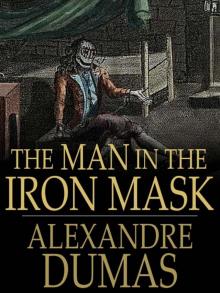 The Man in the Iron Mask
The Man in the Iron Mask The Count of Monte Cristo (Penguin Classics eBook)
The Count of Monte Cristo (Penguin Classics eBook)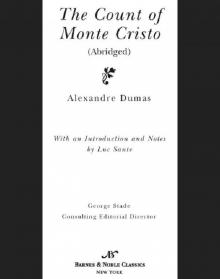 Count of Monte Cristo (abridged) (Barnes & Noble Classics Series)
Count of Monte Cristo (abridged) (Barnes & Noble Classics Series) The Women's War
The Women's War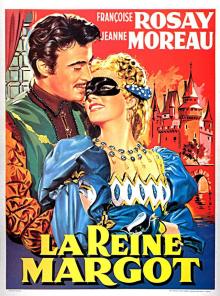 La reine Margot. English
La reine Margot. English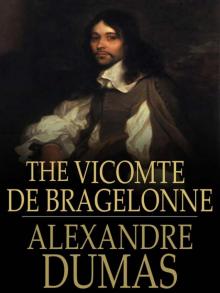 The Vicomte de Bragelonne
The Vicomte de Bragelonne__english_preview.jpg) La dame aux camélias (Novel). English
La dame aux camélias (Novel). English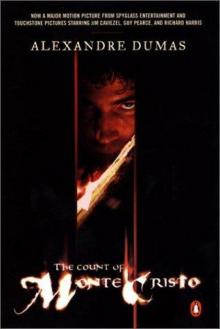 The Count of Monte Cristo
The Count of Monte Cristo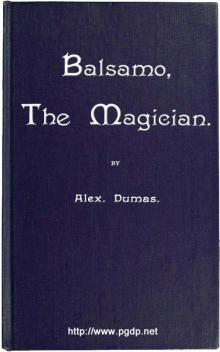 Balsamo, the Magician; or, The Memoirs of a Physician
Balsamo, the Magician; or, The Memoirs of a Physician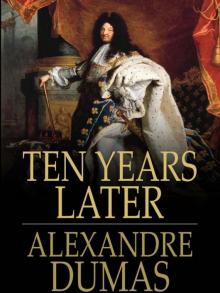 Ten Years Later
Ten Years Later The Romance of Violette
The Romance of Violette The Mesmerist's Victim
The Mesmerist's Victim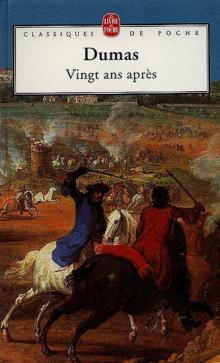 Vingt ans après. English
Vingt ans après. English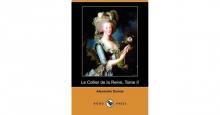 Le collier de la reine. English
Le collier de la reine. English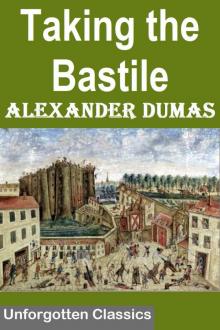 Taking the Bastile; Or, Pitou the Peasant
Taking the Bastile; Or, Pitou the Peasant The Hero of the People: A Historical Romance of Love, Liberty and Loyalty
The Hero of the People: A Historical Romance of Love, Liberty and Loyalty Louise de la Valliere
Louise de la Valliere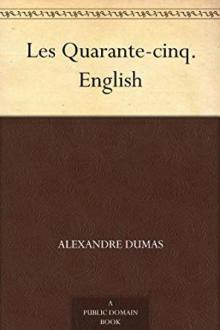 Les Quarante-cinq. English
Les Quarante-cinq. English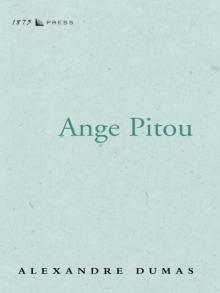 Ange Pitou (Volume 1)
Ange Pitou (Volume 1) The Royal Life Guard; or, the flight of the royal family.
The Royal Life Guard; or, the flight of the royal family.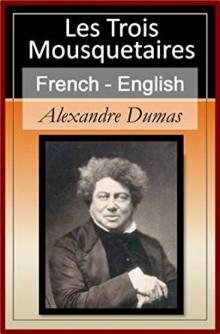 Les trois mousquetaires. English
Les trois mousquetaires. English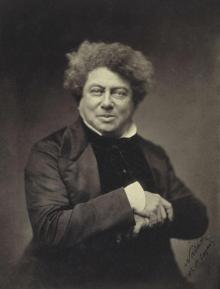 Une fille du régent. English
Une fille du régent. English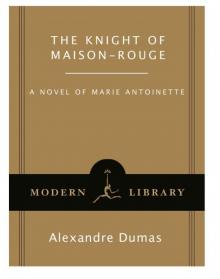 The Knight of Maison-Rouge
The Knight of Maison-Rouge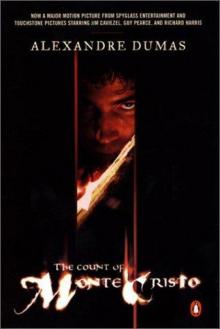 The Count of Monte Cristo (Unabridged Penguin)
The Count of Monte Cristo (Unabridged Penguin) Ange Pitou
Ange Pitou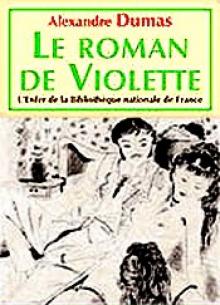 The Romance of Violette (vintage erotica)
The Romance of Violette (vintage erotica) The Three Musketeers
The Three Musketeers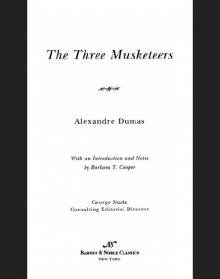 Three Musketeers (Barnes & Noble Classics Series)
Three Musketeers (Barnes & Noble Classics Series)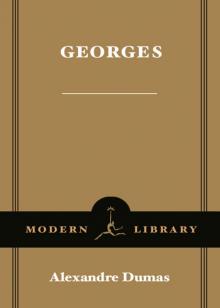 Georges
Georges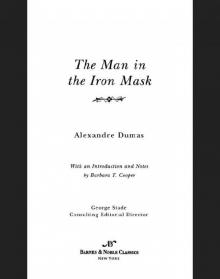 Man in the Iron Mask (Barnes & Noble Classics Series)
Man in the Iron Mask (Barnes & Noble Classics Series) The Red Sphinx
The Red Sphinx